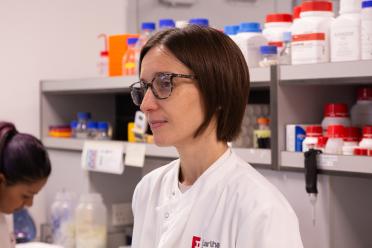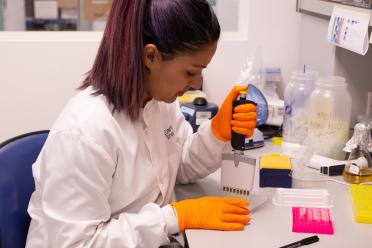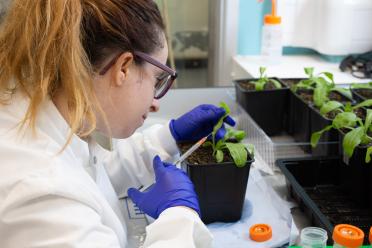Leading with curiosity: forging a career in engineering biology
For International Women in Engineering Day, we spoke to three scientists at the Earlham Institute who reflected on their career paths in engineering biology.
Data suggests that over one million women work in STEM roles in the UK, however women remain significantly underrepresented.
According to EngineeringUK only 16.9% of the workforce in engineering and technology disciplines are women, compared to 83.1% for men. In the past, engineering was typically portrayed as a male-dominated field, and as such, role models, development opportunities, and awareness of potential careers has not been readily communicated for women in education or early-career stages.
The world is facing significant challenges - a rapidly growing population, climate-driven impacts on food production, and an accelerated shift towards technology dependence.
Addressing these complex issues requires the expertise and innovation of those working across the STEM sector, and delivering impactful solutions for society requires diverse perspectives, skills, and lived experiences.
In recent years there has been a concerted effort by organisations, public bodies, and education providers to raise awareness of the broad range of opportunities within STEM, aiming to improve the inclusion of this field to all.
But there is still a lot of work to be done. In the 2023/24 academic year, it’s reported that of students studying engineering and technology at Higher Education level, only 22% were female.
Monday 23 June is International Women in Engineering Day.
Led by The Women’s Engineering Society, the event aims to celebrate the work of female engineers, and spotlight those in the industry who have championed representation and empowerment of women in STEM careers.
Reflecting on their own career paths, we spoke to three scientists at the Earlham Institute working in the field of engineering biology.
Engineering is a wide-ranging field that uses scientific and mathematical methods to design, test and create structures and processes. Engineering is the application of creative problem solving to critical issues affecting the world.
One of the most well-known applications of engineering is civil and structural engineering, responsible for large infrastructure and building construction projects.
But engineering encompasses many other key applications affecting our daily lives including production and manufacturing, software and hardware, sound and electrical, and mechanical engineering.
Dr Carolina Grandellis is the Head of the Earlham Biofoundry – a facility within the Earlham Institute that contributes large-scale, high-throughput engineering of biological systems, promotes the use of automation, and advances bioscience research and innovation in the UK.
Carolina leads a specialist team of scientific and technical experts in large-scale experimentation and synthetic biology.
“My role is to lead the Biofoundry, where we work with automation and engineering biology, on high-throughput screening research projects,” she says.
Carolina is a molecular biologist with experience in plant sciences. Following her PhD in crop sciences, Carolina worked for a biotech company, specialising in plant tissue culture. Prior to joining the Earlham Institute, she worked at The Sainsbury Laboratory on the Norwich Research Park, where she collaborated with industry partners on research to identify novel plant resistance genes and bioengineering approaches.
“Initially I got into bioengineering because I wanted to make contributions to agriculture, using genetic engineering tools to create better crops,” Carolina adds.
Carolina grew up and started her career in Argentina, South America, and says that while not barriers, she still faced significant challenges early-on with key resources such as access to publications, high-quality resources, and the opportunity to attend international conferences.
“Moving to the UK helped alleviate some of these challenges, although it came with the downside of moving away from my culture and family.”
“I would suggest that not only women but everyone looking at STEM careers should follow their curiosity. I think that you can be successful in anything that you choose as long as you bring this passion component to it, and if you are really curious about the technologies, in this case,” she adds.

Dr Carolina Grandellis, Head of the Earlham Biofoundry
Engineering biology is the application of engineering principles to design, build, and test biological systems. It’s a rapidly advancing field with applications across medicine, agriculture, and industrial biomanufacturing, employing cutting-edge techniques including gene editing and synthetic biology approaches.
The field applies engineering principles, such as standardisation, to biological systems through the application of the design-build-test-learn cycle (DBTL).
Engineering biology has been identified as a critical technology for the UK. And the Earlham Biofoundry, part of a network of UK Biofoundries, will be critical to realising the full potential of this technology.
In June 2024 Dr Carolina Grandellis, Head of the Earlham Biofoundry, was interviewed by the House of Lords Science and Technology Committee where she raised concerns over the difficulties faced by Engineering Biology researchers in the UK. She discussed some of the significant issues retaining and recruiting skilled staff particularly international researchers who face additional barriers entering the UK.
Dr Melissa Salmon is a Postdoctoral Researcher working with Dr Grandellis in the Earlham Biofoundry, and also co-leads the Researchers’ Forum at the Earlham Institute.
Melissa studied biochemistry at the University of East Anglia and has previously worked at the University of East Anglia and the John Innes Centre on the Norwich Research Park before joining the Earlham Institute in 2019.
“I was always fascinated by how living systems work, and the advances in genomics have allowed us to really investigate that. I have spent many years working in plant natural products, understanding how plants make valuable medicines. The developments in engineering biology have given us the tools to reproduce the incredible molecular diversity of plants in our own plant factories.” Melissa said.
Before joining the Biofoundry Group Melissa worked with Dr Nicola Patron (now at University of Cambridge) focused on the Asteraceae family of plants (the Daisy family). Using a combination of genomics, molecular biology and biochemistry, Melissa’s work aimed to identify genes responsible for the generation of therapeutic substances within marigolds.
Melissa is passionate about STEM education and frequently takes part in school activities to showcase her field of research. Most recently she developed an activity with the Earlham Institute for the 2025 Norwich Science Festival, explaining how plants make medicinal products.
“You don’t necessarily need to be good at science at school, or good at maths, all those stereotypical things that people think that scientists need to be. You just need to be curious and you need to be hardworking,” added Melissa.

Dr Melissa Salmon, Postdoctoral Researcher in the Earlham Biofoundry
Scientists at the Earlham Institute study complex species, environments, and biological questions - revealing insights into the basic building blocks of life, the interaction of organisms and environments, and how we can harness this in the future.
A new project - funded by a £8.5M grant from the UK Government’s Advanced Research and Invention Agency (ARIA) - is looking to develop the next-generation of climate-resilient crops by using the latest engineering biology tools to introduce beneficial elements to staple crops.
Dr Daria Cuthbert has just joined the Nieduszynski Group at the Earlham Institute as a Postdoctoral Researcher on the ARIA project, developing an effective method to deliver synthetic chromosomes from yeast into plant cells.

Dr Daria Cuthbert, Postdoctoral Researcher at the Earlham Institute
“I’m inspired by the pace of innovation in engineering biology – it’s an exciting time to be part of a field that is rapidly evolving. I also love working alongside brilliant, creative scientists who are driven by the potential to solve real-world challenges through their work in synthetic biology," says Daria.
Prior to her Postdoctoral role, Daria was a John Innes Foundation PhD researcher at the Earlham Institute, working with Dr Melissa Salmon studying pot marigolds to identify their anti-inflammatory compounds, and how the plant produces them.
Daria completed a BSc in Biotechnology at the Russian Technological University, followed by an MSc in Biotechnology and Synthetic Biology at the University of Edinburgh before joining the Earlham Institute PhD programme.
“STEM is not about knowing everything from the start, but about exploring, learning, and collaborating with others to solve problems that often require an interdisciplinary approach. My advice to anyone looking to pursue a STEM subject would be to stay curious, ask questions, and don’t be afraid to make mistakes," Daria adds.
Related Reading:

Applications are currently open for a Group Leader in Engineering Biology to join the Earlham Institute Research Faculty.
We particularly encourage applicants who would utilise the Institute’s Biofoundry capability, and/or are applying AI approaches to the design, build, test, learn cycle.